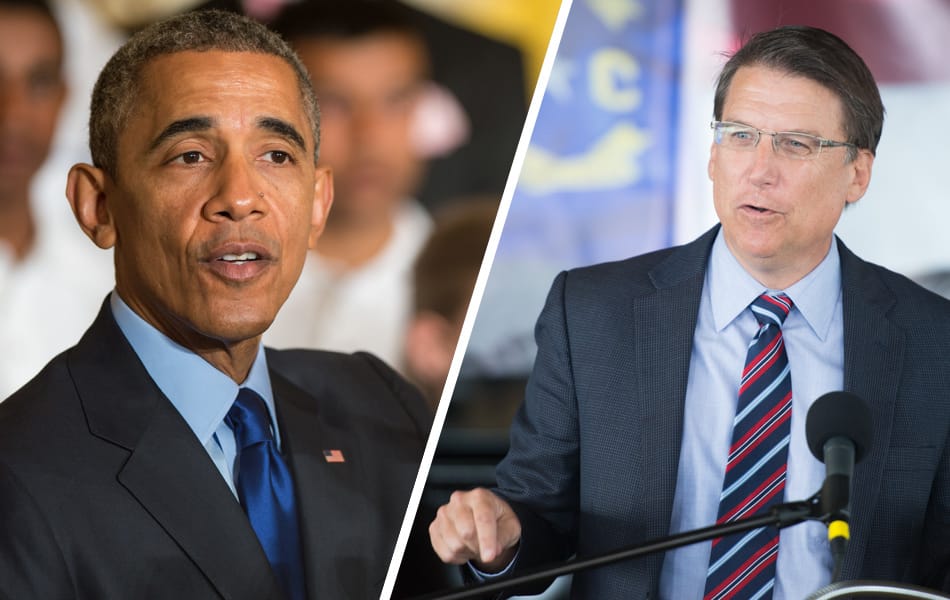

The modern presidency seems as located on Air Force One as in that grand white mansion on Pennsylvania Avenue. Presidents dash around the country not only when they campaign for votes, but also, increasingly, as a means to rally public support for policies originating in the White House.
North Carolina has grown accustomed to having President Obama visit. He has appeared at UNC-Chapel Hill, N.C. State, Forsyth Technical Community College, the American Legion Convention in Charlotte, and at high-tech companies, not to mention the 2012 Democratic National Convention in Charlotte.
Obama has visited so often that his quick trip to Charlotte a few days ago for what was billed as a “working mothers town hall’’ generated barely a ripple in the national or state media. To be fair, his remarks and responses to questions from his audience and through two women-oriented websites didn’t produce big “breaking news.” Still, the event had a rather unusual moment, a departure from the norm in a president’s approach to a host state, a presidential observation worth pondering as North Carolina debates the future of public education.
Typically, presidents arrive in a state prepared to spread a bit of praise, speak to an issue of special local interest and cite data to show how his policies would affect the people in the place where he visits. A well-briefed Obama, for example, argued for his proposal to extend further tax relief to offset child-care costs by saying, “In 31 states, including North Carolina, high-quality child care costs are higher than a year of tuition at a state university. Average cost here in North Carolina, $16,000 for child care.”
It was in an exchange with a woman blogger, with three children and a husband she identified as a public school teacher, that the president took a somewhat unconventional turn. He steered directly into the great debate in North Carolina over the future of public education.
“Now, I’m just going to editorialize a little bit,” Obama said, as he signaled his turn. “Here in North Carolina, this used to be the state in which the promise of education was understood at the state government level, and the reason North Carolina did better economically than many of the other Mid-Atlantic and Southern states was because of the Research Triangle and the emphasis on education — and my good friend, Jim Hunt, the Governor, who used to place such a big emphasis on it.”
“Funding now here in the state and teacher pay is ranking as low as it gets. And so part of it is just pointing that out and hopefully understanding this shouldn’t be a partisan issue. It shouldn’t matter whether you’re a Republican or Democrat; you should want to make sure that schools are successful. And that requires teachers that are motivated, have professional training, but are also making enough of a living that they can afford a middle-class lifestyle.”
He got a round of applause from his audience in Charlotte. Then the conversation went on to early childhood education. The Democratic president noted his administration’s early childhood education grants, and specifically mentioned initiatives by the Republican governors of Oklahoma and Georgia. He did not mentioned Pat McCrory, the Republican governor of North Carolina.
The president’s remarks did not go unnoticed in the governor’s office in Raleigh. Shortly after Obama departed from Charlotte, McCrory issued a statement that he was “disappointed to learn that the President used a portion of his quick visit today to unfairly and incorrectly malign our education system in the great state of North Carolina.”
“The facts are clear,” said the Republican governor. “I signed one of the largest teacher raises in state history and more students are graduating high school now than during any time the three Democrat governors who preceded me were in office.”
No doubt, the Republican governor and his Democratic opponent in 2016 will debate over which “facts are clear.” His retort to the president touches on two issues that are surely worth of robust debate.
Teacher pay has eroded since the Great Recession — before McCrory was elected. And yes, he signed a significant pay raise package last year. It was a pay raise designed both to boost salaries for young teachers at the lower end of the scale and to fit within the revenue stream re-configured by a tax cut package he also signed. In the National Education Association report issued in March, average pay for North Carolina teachers in 2014 fell below the averages in the bordering states of South Carolina, Virginia, Georgia and Tennessee – but taking into account enactment of the teacher salary package, NEA estimates that North Carolina will move from 47th to 42nd in the 2015 rankings.
Yes, the high school graduation rate rose during McCrory’s first two years in office. In fact, it has risen every year since 2006, six years before McCrory’s election. It’s worth debating whether McCrory’s policies or the policies of the Democratic governors who preceded him had the greater influence on the 2013 and 2014 graduation rates. It’s also worth exploring how many of these graduates are prepared, or not, for career or college.
In this era of partisan polarization, it’s highly unlikely that the super-Republican majority in the General Assembly would change course in response to “editorializing’’ from the Democratic president in the second half of his second term.
Still, the president’s and the governor’s remarks signal how much education policy stands at the center of political debate in this state, as it should, and how much North Carolina’s reputation revolves around the quality of its schools, colleges and universities.
Here’s a link to The Charlotte Observer coverage, with a video of the president’s remarks mentioned in this column.
Here’s a link to the White House transcript of the entire Working Mothers Town Hall in Charlotte.
Here’s a link to Governor McCrory’s statement.


